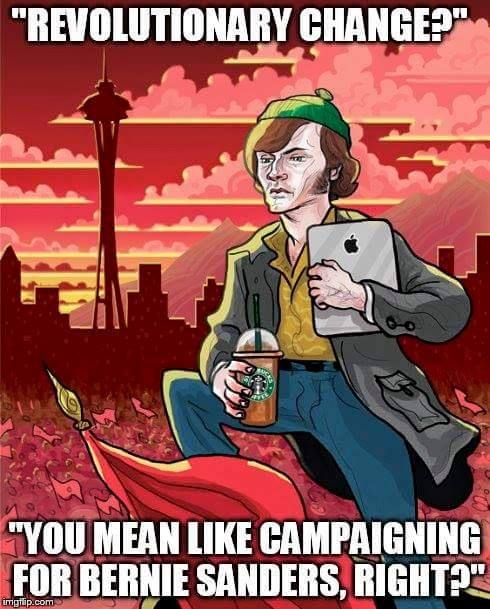Sartwell, the Principle of Hierarchical Coincidence and Actually-Existing Socialism
Crispin Sartwell has a great new article recently at Splice, on “The Newnew Left and the Principle of Hierarchical Coincidence.” Quoth he:
The classical socialism of people like Corbyn and Sanders had been developed, in detail, by the middle of the 19th century. It was designed as a response to the rise of rapacious industrial capitalism, and it specifically proposed to rein in capital by vast expansions of state power, or the annexation of more and more resources, powers, segments of the culture by government.. . . The concrete proposals amount to increased state control of many or even all segments of human life, from cradle to grave.
I think you're going to need some new ideas, because there's one breathtaking theoretical and practical problem with classical socialism. It proceeds in massive unawareness of a fundamental principle in political theory and political reality, which I call the principle of hierarchical coincidence (PHC): the idea that, in more or less every case and in the long run, political and economic hierarchies tend to coincide. Economic power leads to political power; political power leads to economic power.
. . . For this reason, and for the most part and in the long run, ever-increasing state power as recommended in socialism will tend to increase rather than ameliorate economic inequality. And though governments do sometimes and to some extent reduce economic inequality, they do so in a situation in which the seemingly intractable political/economic structure is largely produced, held in place, and enforced by these governments themselves. The structure of economic inequality rests to a large extent on political and police power, and certainly couldn't be maintained without it.
This is the incoherence at the heart of classical socialism: that intensifying political power, at least of a certain kind, will in the long run reduce economic inequality. But if you start
nationalizingorsocializingvarious segments of the economy—that is, if you give these powers to the state–you don't move toward an egalitarian paradise, you simply create a new ascendant class. . . .–Crispin Sartwell, The Newnew Left and the Principle of Hierarchical Coincidence
SpliceToday, 13 June 2017.
Shared Article from SpliceToday
The Newnew Left and the Principle of Hierarchical Coincidence
There's one breathtaking theoretical and practical problem with classical socialism.
Crispin Sartwell @ splicetoday.com
What I want to add here some responses to the pat rejoinders that I think are most likely to get thrown out quickly in response to the problem Sartwell raises, but which are really idle as objections to Sartwell’s point.
First, it is entirely idle to point out that state socialism is intended to combat hierarchical coincidence, and if only it could be properly politically implemented, it would tend to reduce inequality more and more and hence more and more make the problem evaporate rather than stabilizing or spiraling out of control. Whatever its theoretical intent, the effect in actually-existing state socialism is entirely different.
If there were some way to implement state socialist programs exactly to the ideological socialist’s specification, without serious political complication, bureaucratic redirection and mission creep, or unintended consequences, then sure, we’d have to hash out whether the total effects of the system tend to reinforce or to weaken the problem of hierarchical coincidence, on net, over short-term and long-term time spans. But there is no such way.[1]
Second, there’s a lesson which many socialists today might take from a point like Sartwell’s, which does represent some progress, but which really goes a lot less far than they might think. In particular, it’s really easy to look at Sartwell’s discussion of the problems posed by increased state economic control, and conclude that the easy solution to the problem is to become an anarchistic socialist, instead of a state socialist. No state, no state power to back up economic power. And of course I’d hardly want to ward anyone off of anarchistic socialism — since that is, after all, what I believe in some forms.
But if you think of the structure of a socialistic anarchy as combating inequality with more or less the same sorts of socialization and collectivization proposed by state socialists — just in the hands of grassroots collectives, administered locally and democratically without state power by the same people who work in them — then I would argue that you have not eliminated the problem of hierarchical coincidence by eliminating the state police power, or by moving from electoral power to social capital as your means of administering the distribution of economic resources. Because, of course, there are such things as hierarchies of social power and prestige, even outside of state structures. Substituting social capital for political power brings some obvious benefits, because political power involves greater institutionalization, more formalized excuses for legitimacy, literally lethal repertoires of force to exert, etc. But the ability to wield social power within collectivized economic institutions, and so to continuously reinforce economic and social power, does not easily disappear even with the removal of the state. It becomes easier to combat; and maybe an easier fight is the best we can realistically hope for. But maybe, on the other hand, the goal should be to make sure that realistic alternatives to existing collective entities, dissent, exit, open competition, and other routes for centrifugal economic and social forces to dynamically express themselves, are firmly incorporated into our economic activities and our socio-economic institutions.
- [1]You might say, “but the lack of immaculate conception is a problem for any duty proposing serious changes to the political system — including libertarianism, including market anarchism, including everything.” And you’d be right. It’s a really serious problem for any form of reformist libertarianism, and a major explanation for why it often degrades into standard right-wing business regulation politics. Anarchism doesn’t eliminate the problem; but it ameliorates it, precisely to the extent that the anarchist deliberately breaks from political strategies that open up the largest opportunities for political complication, bureaucratic redirection and mission creep, or unintended consequences. But if solving the problem were easy, revolution would be easy, and it’s no surprise that it isn’t.↩




